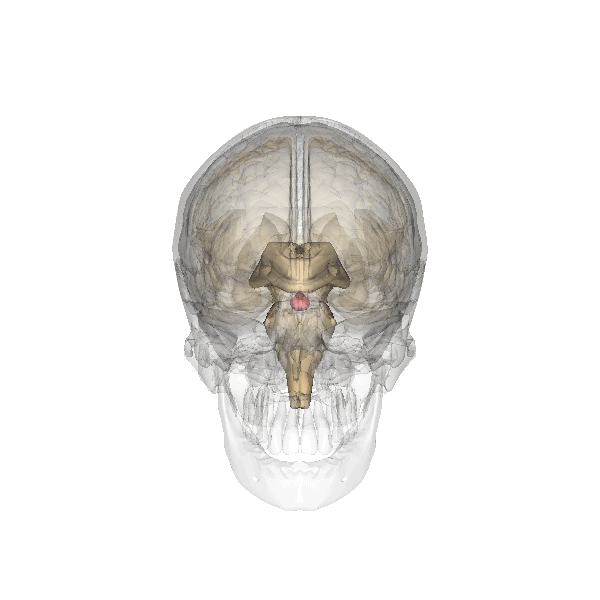From Lewis S. Blevins, Jr. MD –
I define hypopituitarism as the partial or complete deficiency of one or more anterior pituitary hormones. Panhypopituitarism is, of course, deficiency of all of the anterior pituitary hormones. I like to include diabetes insipidus as a separate disorder if it also exists.
By partial or complete deficiency I mean that a particular hormone may be deficient in a mild, moderate, or severe (complete) degree.
One or more pituitary hormones may be affected. The deficiencies may be all partial, all complete, or a combination of some partial deficiencies and other complete deficiencies. For example, a man with a non-secreting pituitary tumor may have complete growth hormone deficiency, partial testosterone deficiency, and normal pituitary thyroid and adrenal function.
There appears to be a hierarchy of loss of pituitary functions in the setting of pituitary diseases. This is partially related to the dispersion of the different hormone secreting pituitary cells located within the gland itself and also the teleologic significance of certain hormones. In general, growth hormone is lost first, followed by the gonadotropins (FSH, LH) and prolactin, then TSH, followed by ACTH. Growth and reproduction “cost” a significant amount of energy. Thus, it makes sense that one would lose these hormones first if one were to get “sick.” On the other hand, thyroid and adrenal functions are essential for life and it makes sense that these would be preserved even in the face of significant illness or extensive pituitary disease. While this pattern of loss is seen commonly, there are exceptions. For example, some patients seem to be missing only TSH and others only ACTH. However, the exceptions to the rule are indeed “rare.”
Interestingly, some glands have the ability to produce some hormone regardless of whether the pituitary is in control. Thus, some patients with pituitary disease may have more mild manifestations of a particular disorder than would patients with the relevant target gland problem. For example, a patient who has had her thyroid gland surgically removed, and is not treated with thyroid hormone, would have a severe deficiency of thyroxine. On the other hand, a patient with hypopituitarism may actually produce enough thyroxine, even in the absence of TSH, so that the free T4 level is either only slightly low or perhaps low normal. I will say, however, that the adrenal glands do not seem to be able to produce much cortisol, unless revved up by exogenous ACTH, when there is a complete deficiency of ACTH. This observation reminds me to share that pituitary hormones are “trophic” or growth promoting hormones for target glands. For example, patients with chronic ACTH deficiency leading to adrenal insufficiency can be stimulated to produce cortisol by administering ACTH to prime the adrenal glands. Also, patients with hypogonadism due to pituitary deficiency can be stimulated to make gonadal sex steroids by the administration of hCG and FSH. In essence, the target glands can be “awakened” in the setting of hypopituitarism by administration of pituitary hormones.
We used to define pituitary dysfunction as causing “secondary” target gland deficiencies and hypothalamic dysfunction as causing “tertiary” target gland hormone deficiencies. Mostly, we refer to pituitary or hypothalamic deficiencies as causing “central” target gland deficiencies. For example, I might use the term “central hypothyroidism” rather than secondary or tertiary hypothyroidism.
The clinical translation of all of this is that patients with pituitary disorders may present with mild, moderate, or severe deficiency of the hormones of the pituitary and target glands. Unfortunately, however, most of the symptoms and signs are nonspecific and there is considerable overlap in symptoms ascribed to the different deficiency states. Furthermore, not all patients have all of the symptoms of a particular hormone deficiency and some patients may only have some of the less common manifestations.
Symptoms and signs of growth hormone deficiency include fatigue, decreased energy, exercise intolerance, “brain fog,”abnormal cognitive functions, loss of muscle mass, gain in fat mass, weight gain, sexual dysfunction, social isolation, decreased bone density, hypercholesterolemia and increased cardiovascular risk. Of course, children with growth, deficiency may have short stature. They are often overweight.
Prolactin deficiency is often associated with inability to breast feed an infant. There is some evidence that prolactin deficiency might also lead to a luteal phase defect and consequent infertility.
In man, sex hormone deficiency might lead to weakness, decreased strength, gain in fat mass, easy fatigability, loss of muscle mass, depression, emotional lability, hot flashes and flushes, diminished or loss of libido, erectile dysfunction including impotence, impaired ability to ejaculate, and infertility.
In women, sex hormone deficiency might lead to abnormal menses, diminish size of the breasts vaginal dryness, dyspareunia (painful intercourse), increased risk of urinary tract infections, depression, hot flashes and flushes, emotional lability, diminished libido, anorgasmia, and infertility.
Symptoms and signs of central hypothyroidism might include weakness, fatigue, decreased energy, increased need for sleep, cold intolerance, and weight gain. Myxedema, dry skin, slowing of the heart rate, hoarseness, and other “textbook” manifestations of hypothyroidism are all more common in patients with primary hypothyroidism than they are in central hypothyroidism.
Symptoms and signs of cortisol deficiency include weakness, fatigue, loss of appetite, weight loss, lack of motivation and drive, difficulty recovering from minor illnesses and accidents, hypoglycemia, hyponatremia, and a slightly low blood pressure.
Multiple pituitary hormone deficiencies can lead to a nonspecific anemia. Also, the combination of adrenal insufficiency and gonadal deficiency can lead to loss of secondary sexual hair such as the hair in the underarms and over the pubic area. Some patients with hypopituitarism are said to have fine wrinkling of the skin about the face. I personally believe this is largely attributed to chronic growth hormone deficiency. Some patients with hypopituitarism appear chronically ill. Others look much younger than their stated age.
Remember, hypopituitarism is a partial or complete deficiency of one or more anterior pituitary hormones. Symptoms and signs overlap, vary from patient to patient, and may be mild, moderate, or severe.
© 2015, Pituitary World News. All rights reserved.
